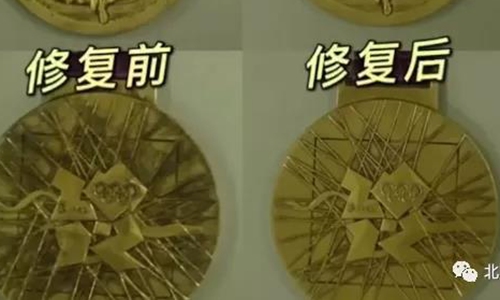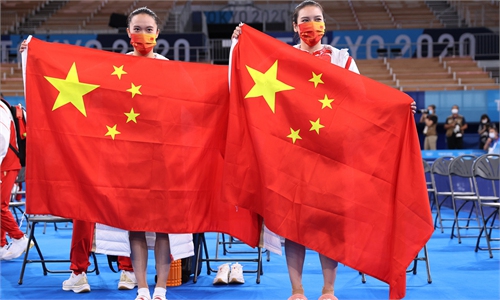Questions raised over 'made in UK' after Chinese champion’s London gold medal oxidizes

Photo: Web
Following a Chinese Olympian posting about her peeling Tokyo gold medal, another Olympic champion, Xu Lijia, has posted a video in which she said that her London Olympic gold medal had "oxidized."
The Chinese sailing champion recently posted a video on Sina Weibo of herself at the China Maritime Museum in Shanghai, which has an exhibit of her donated personal items, including her uniform and the gold medal she won at the 2012 London Olympics and the bronze she obtained during the 2008 Beijing Olympics.
In the video, she notes that she was surprised to see that her gold medal had turned a dark color, which a restoration expert at the museum later told her was due to oxidization.
In the video, the gold medal has clearly become tarnished, standing in sharp contrast with the still "well-preserved" bronze medal.
Xu noted that the restorer cleaned her medal and explained what had happened.
"The restorer said that this medal is in fact made of silver, and only its surface is plated with a layer of gold. That's why it oxidized so easily," Xu explained.
Xu is not the only athlete whose London gold medal suffered from oxidization, as Olympic gymnastics champion Deng Linlin has also noticed such issue with her gold medal.
Deng said in a livestream in August that the gold medal she won in London has "discolored into a rather bronze one due to severe oxidization."
Regarding her gold medal from Beijing 2008, Deng said that it has a much higher gold content and that "there would be teeth marks if you bit them."
Concerns about the quality of gold medals was also raised by Chinese netizens after Chinese trampoline athlete Zhu Xueying posted that she noticed her Tokyo Olympic gold medal was peeling.
The Organizing Committee of the Tokyo Olympic Games told the Global Times that the part of the medal that came off was not the gold plating, but a coating applied to the surface of the medal. The committee noted that the thin coating is meant to prevent small scratches and stains from appearing on the medals.



